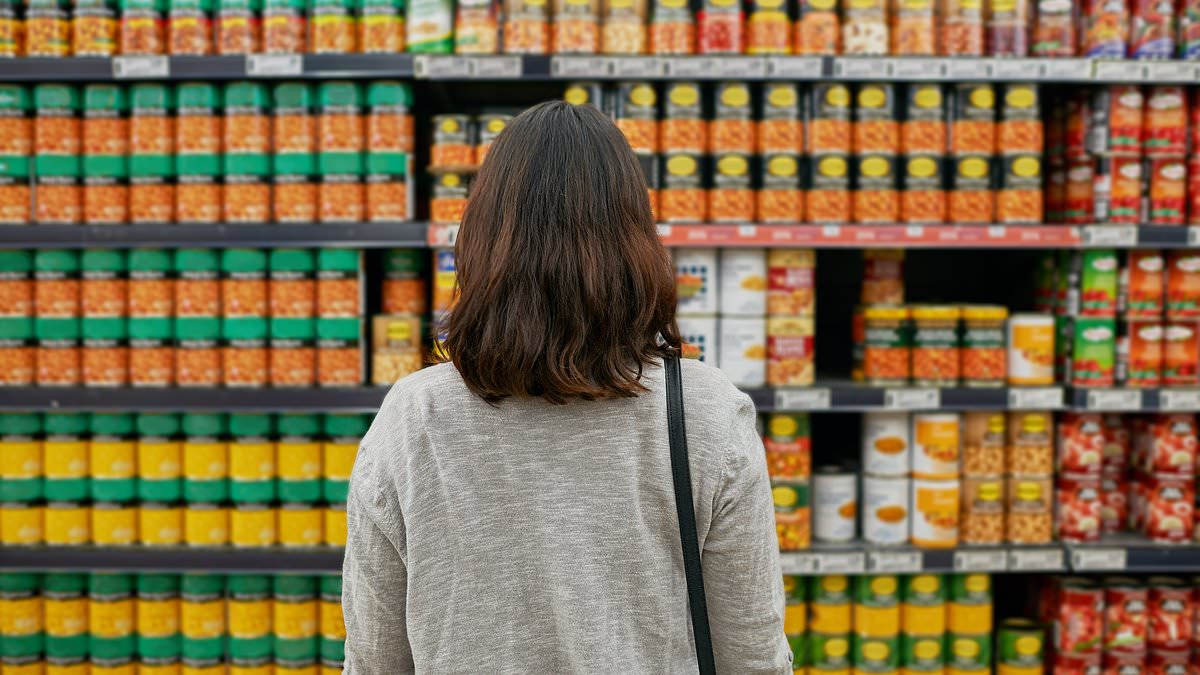Copyright dailymail

Tinned superfoods that cost less than a £1 that EVERYONE should always have in the cupboard, according to top nutrition experts READ MORE: Frozen, tinned or fresh? Top diet experts reveal which is healthiest By MEIKE LEONARD, HEALTH REPORTER Published: 10:00 GMT, 27 October 2025 | Updated: 10:00 GMT, 27 October 2025 They're cheap, cheerful and last for years and years. And far from going out of style, surveys suggest we're eating more tinned foods than ever before. Half of all Britons have up to ten tins stashed in their cupboards at any time, whilst a quarter of us eat more than we did ten years ago, studies have shown. In fact, Birmingham was crowned the 'canned food capital' of the UK – with residents consuming an average of four tins each per week – according to the study by Canned Food UK. And with rising food prices, stalling salaries, and a cost-of-living crisis, it's not surprising that we're seeing a tinned food renaissance. But it's not just their long shelf life, cost-effectiveness and convenience that makes them a pantry must-have. Top nutrition experts speaking to the Daily Mail say tinned foods can and should play a vital role in a healthy diet – and could, in some cases, be even more nutritious than when eaten fresh! So read on for the top five expert picks of tins that you need in your larder – all for less than £1. Half of all Britons have up to ten tins stashed in their cupboards at any time, whilst a quarter of us eat more than we did ten years ago, studies have shown Tinned tomatoes £0.47 for 400g at Tesco They're basic and incredibly versatile – and most likely, you've already got a tin or two. But what many don't know about tinned tomatoes, says registered dietician and author of How to Not Eat Ultraprocessed, Nichola Ludlam-Raine, is that they can actually be more nutritious when tinned than fresh. 'Tinned tomatoes are a pantry staple – they're a great source of vitamin C and count as one of your five a day,' she said. 'But they also contain something called lycopene – and in greater quantities than can be found in fresh tomatoes.' A powerful antioxidant, lycopene is linked to a reduced risk of chronic diseases like prostate, lung and stomach cancers, as well as having a protective effect for cardiovascular disease. Drinking tomato juice has also been shown to help muscle recovery after exercise. Tinned tomatoes can actually be more nutritious than when eaten fresh, says dietician Nichola Ludlam-Raine Athletes given either an energy drink or tomato juice after strenuous exercise as part of a Greek study found that those who drank the tomato juice showed signs of quicker muscle recovery and reduced inflammation markers in their blood. Lycopene is also responsible for tomatoes' characteristic red colour. The antioxidant becomes even more effective when the fruits are cooked – giving tinned tomatoes, which are heat processed to preserve them, the upper hand on fresh ones. Cooking them will only increase lycopene content, says Ms Ludlam-Raine – so add them to any soup or stew you're whipping up. Tinned mackerel £1 for 125g at Sainsbury's Tinned fish is another pantry superfood, say experts. 'Particularly for anyone who doesn't eat much dairy,' says paediatric dietician Emma Shafqat, 'tinned fish can be a brilliant source of calcium.' Tinned mackerel is packed with omega 3 fatty acids and calcium, from the tiny fish bones To ensure you get all the benefits, stick to small fish like sardines and mackerel, which contain calcium-rich, but still edible, tiny bones. Nutritionist shares the eyesight-boosting foods you need to be piling on your plate... and it's not just carrots Tinned salmon is another great option, says Ms Shafqat – though it's usually a bit more expensive. 'I make sure to always have a few tins of sardines in tomato sauce stocked in my house,' she said. 'They're packed with omega-3 fatty acids, which the body can't make on its own, but are vital for our brains, hearts and cell health. 'And if you get the ones in tomato sauce, you get all the benefit of the tomatoes as well.' Tinned tuna, whilst a great source of low-fat protein, doesn't have the same benefits as other forms of tinned fish, as the omega 3 is already taken out and used in health supplements, adds Ms Shafqat. Tinned chickpeas £0.49 for 400g at Sainsbury's Recent research suggests that eating a tin of chickpeas a day could be key to beating dangerous high cholesterol—a leading cause of heart disease and stroke It's another familiar favourite. Used in hummus, curries and falafel, the humble chickpea is a mainstay of several different cultural cuisines. And recent research suggests that eating a tin of chickpeas a day could be key to beating dangerous high cholesterol—a leading cause of heart disease and stroke. An intriguing new study from scientists in the US found that those who added the tinned favourite to their daily diet for a period of three months saw their originally high levels of the harmful fat drop to within the normal range. Packed with nutrients including fibre, iron, folate and vitamin C, just a half cup serving contains nearly 20 grams of protein. And they're not just good for the heart. Chickpeas have been shown to help weight management, control blood sugar and improve digestion. For Ms Shafqat, they're a regular addition to the most unexpected weeknight meals. A daily cup of 48p food could dramatically slash heart attack risk, study suggests 'Chickpeas are very high in iron, and, most importantly, are beige – meaning you can add them into almost anything without picky eaters noticing,' she said. 'I like to mash them into sauces and add them to dishes like macaroni and cheese – they give that extra boost of iron, and you can't notice they're there when you eat it. 'Butter beans do essentially the same thing – and are also packed with fibre.' Tinned lentils £0.65 for 400g at Waitrose Lentils are another essential tinned legume to keep on your larder shelf, says Ms Shafqat. Like chickpeas, lentils are a brilliant source of plant-based protein, as well as fibre, iron, folate, magnesium and potassium. Just one cup of lentils contains a whopping 18 grams of protein and 16 grams of fibre, and they've been shown to promote the growth of healthy gut bacteria. And tinned lentils are a particularly convenient way to consume them – rather than having to rehydrate them overnight. 'I like to add tinned lentils when I make rice,' says Ms Shafqat. Just one 80g portion of tinned fruit counts as one of your five a day - and can be added to porridge or yoghurt for breakfast 'It's a great protein source, and a simple meal of rice and lentils can give you all the amino acids you need. Add it to a salad, or serve as a side dish.' Black lentils are especially good, she added, with higher protein and fibre levels than the red or brown lentil variants. Tinned peaches £0.39 for 411g at Tesco You've likely got a dusty tin sitting right at the back of a cupboard somewhere. But dietician Nichola Ludham-Raine thinks it's time that tinned fruit is brought back to the forefront. Five of the best baked beans: Dietitian gives the lowdown on the healthiest tinned beans in the supermarket 'Any kind of tinned fruit is really nice to add to yoghurt or kefir for breakfast, or as a healthy dessert,' she said. 'It's great if you've run out of fresh fruit – and an 80g portion counts as one of your five a day.' Try the nation's favourite – tinned pineapple – or tinned peaches, mandarins or pears if that doesn't float your boat. And though vitamin C content is depleted when fruit and vegetables are canned, vitamins A and E – needed for healthy bones, skin and eyes – are actually better preserved in the process. Just make sure you buy fruit tinned in juice, not syrup, adds Ms Ludham-Raine, to avoid consuming extra sugar. 'I usually drain off most of the juice when I eat tinned fruit anyway – especially if I've already had a glass of juice that morning,' she says. Share or comment on this article: Tinned superfoods that cost less than a £1 that EVERYONE should always have in the cupboard, according to top nutrition experts Add comment



